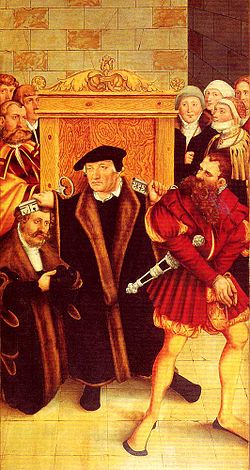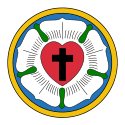- Johannes Bugenhagen
-
This article is about the German religious leader. For the video game character, see List of Final Fantasy VII characters#Bugenhagen.
Johannes Bugenhagen 
Bugenhagen in 1537 by Lucas CranachBorn 24 June 1485[1]
Wollin (Wolin), Pomerania, Holy Roman Empire[1]Died 20 April 1558 (aged 72)[1]
Wittenberg, Saxony, Holy Roman Empire[1]Occupation Priest, Theologian Spouse Walpurga Bugenhagen, maiden name unknown (13 October 1522)[2] Children Johannes[2] (the Younger, 1531/2-1592, professor for theology at the University of Wittenberg)[3]
Martha[2]
Sara[2]Parents Gerhard Bugenhagen[1] Johannes Bugenhagen (24 June 1485 – 20 April 1558), also called Doctor Pomeranus by Martin Luther, introduced the Protestant Reformation in the Duchy of Pomerania and Denmark in the 16th century. Among his major accomplishments was organization of Lutheran churches in Northern Germany and Scandinavia. He has also been called second Apostle of the North.
Johannes Bugenhagen was pastor to Martin Luther at St. Mary's church in Wittenberg. He is also commemorated in the Calendar of Saints of the Lutheran Church - Missouri Synod as a pastor on 20 April.
Contents
Biography
Early life
Bugenhagen was born in Wollin (now Wolin), Duchy of Pomerania, on 24 June 1485 as one of three children of local Ratsherr Gerhard Bugenhagen. From 1502 to 1504, he studied artes at the University of Greifswald. In 1504, he moved to Treptow an der Rega (now Trzebiatów) and became Rektor of the local school. Though he had not studied theology, he was ordinated as a priest in Treptow's St. Mary's church in 1509, and served as a vicar at the Kannonikerkolleg of that church thereafter.[1]
In 1517, abbot Johann Boldewan called Bugenhagen to his nearby Belbuck Abbey, where he was appointed Biblical lecturer, where Boldewan and Bugenhagen became the core of a Humanist circle.[1] Duke Bogislav X of Pomerania ordered Bugenhagen to write down the history of Pomerania in Latin. The year 1518 is the beginning of historical writing of the combined territory Pomerania.
Bugenhagen first encountered the theology of Luther in the reformer's Prelude on the Babylonian Captivity of the Church in 1520. At first he did not like Luther's thoughts at all. However, once he had studied it more, Bugenhagen became a supporter of the Reformation and moved to Wittenberg.
Wittenberg
In Wittenberg, Bugenhagen became the parish pastor[4] and Martin Luther's friend and confessor.[5] He was a member of Luther's team translating the Holy Bible from Latin to German, and opened the debate on Ulrich Zwingli's reforms.[5] By 1523, his private lectures had become well known, so he was called to lecture the following years at the Leucorea, the university in Wittenberg[6] (today Martin Luther University). Bugenhagen was among the most important reformers of Bible exegesis in the Wittenberg-centered Protestant Reformation, and ordinated a whole generation of Lutheran theologists educated at this university.[5]
 Die Predigt rechter Altarflügel der Vorderseite des Altars der Wittenberger Stadtkirche by Lucas Cranach the Elder. Note the keys of the kingdom in Bugenhagen's hands
Die Predigt rechter Altarflügel der Vorderseite des Altars der Wittenberger Stadtkirche by Lucas Cranach the Elder. Note the keys of the kingdom in Bugenhagen's hands
On 17 March 1533,[7] he was promoted doctor of theology at the university of Wittenberg, together with Johannes Aepinus and Kaspar Cruciger.[7][8] The promotion was supervised by Martin Luther, based on Philipp Melanchthon's theses, financed and attended by Frederick III, Elector of Saxony, and formally granted by deacon Justus Jonas. With the ceremony in Wittenberg's palace church (Schloßkirche),[7] Aepinus, Bugenhagen and Cruciger became the first three Protestant doctors of theology.[8] While theological doctoral promotions had been suspended in Wittenberg for the preceding eight years,[9] the promotion of Aepinus had become necessary as the Hamburg burghers demanded their new superintendent to bear the title of a doctor.[8][nb 1] Melanchton had written the speech for Jonas which laid the foundation of a Protestant doctorate, and Frederick III "the Wise" sponsored a subsequent celebration to introduce the new Protestant doctorate to the theological world.[7]
Reformatory work
After he had outlined his reform ideas in a letter to the Hamburg community, Bugenhagen was the most important figure in the Protestant Reformation in Northern Germany and Scandinavia.[5] He took an active lead in creating new church regularities (Kirchenordnungen) for Hildesheim (1544),[5] Hamburg (1528/29),[5][10] Lübeck (1530–1532),[5] the Duchy of Pomerania (1534/5),[5] East Frisia (1534/5),[5] Schleswig-Holstein (1542),[11] Braunschweig (1528),[5][10] Brunswick-Wolfenbüttel (1543),[5] and Denmark-Norway (1537),[11] where he also coronated Christian III.[12]
This earned him later the epithet second Apostle of the North.[13] Not only did he create the new rules, he also established them and convinced people to follow them. Bugenhagen produced rules and regulations for religious service, for schooling, and for social issues of the church. In 1539, he became superintendent of the Lutheran Church in Saxony.
Also in 1539, Bugenhagen reformed the Pomeranian University of Greifswald, which he "re-founded" as a Protestant university, modelled after the university of Wittenberg.[14]
Late life
After the death of Luther in 1546, Bugenhagen took care of Luther's widow and children. Bugenhagen died in Wittenberg in 1558 and was buried at St. Mary's church. Other than for his theological opinions, Bugenhagen was also well-known because of his organising ability. Bugenhagen was also appreciated for his work in making a Middle Low German translation of Luther's Bible in 1534.
Johannes Bugenhagen was always a pastor at heart, and because of his love for music, his family coat of arms shows a harp.
See also
- Pomerania during the Early Modern Age
- Reformation in Denmark-Norway and Holstein
Notes
- ^ In a letter to Bugenhagen, the Hamburg burghers demanded that their new superintendent Aepinus must "eyne Qualificerde parsonne nemptlick doctor theology syn" ("be a qualified person, that is a doctor of theology"). Selderhuis & Wriedt (2006), p.58
Sources
References
- ^ a b c d e f g Kopitzsch & Brietzke (2001), p.79
- ^ a b c d Steinwachs & Pietsch (2000), p.27
- ^ Nieden (2006), p.105
- ^ Nieden (2006), pp.46,51
- ^ a b c d e f g h i j k Kaufmann (1998), p.58
- ^ Nieden (2006), pp.46-47
- ^ a b c d Nieden (2006), p.62
- ^ a b c Selderhuis & Wriedt (2006), p.58
- ^ Nieden (2006), p.61
- ^ a b Selderhuis & Wriedt (2006), p.55
- ^ a b Lorentzen (2008), p. 39
- ^ Lockhart (2007), p. 64
- ^ Zietz (1834); Schneider (2008), p.4.
- ^ Selderhuis & Wriedt (2006), p.60
Bibliography
- Nieden, Marcel (2006) (in German). Die Erfindung des Theologen. Wittenberger Anweisungen zum Theologiestudium im Zeitalter von Reformation und Konfessionalisierung. Spätmittelalter und Reformation. 28. Mohr Siebeck. ISBN 3161488784.
- Kaufmann, Thomas (1998) (in German). Reformatoren. Kleine Reihe Vandenhoeck und Ruprecht. 4004. Vandenhoeck & Ruprecht. ISBN 3525340044.
- Kopitzsch, Franklin; Brietzke, Dirk (2001) (in German). Hamburgische Biografie. Personenlexikon. II. Wallstein. ISBN 3767213664.
- Hans-Günter Leder, Johannes Bugenhagen Pomeranus – vom Reformer zum Reformator. Studien zur Biographie (Frankfurt-am-Main: Peter Lang, 2002) (Greifswalder theologische Forschungen, 4).
- Hans-Günter Leder, Johannes Bugenhagen Pomeranus - Nachgelassene Studien zur Biographie mit einer Bibliographie zur Johannes Bugenhagen-Forschung, herausgegeben von Irmfried Garbe und Volker Gummelt (Frankfurt-am-Main, Peter Lang, 2008) (Greifswalder theologische Forschungen, 15).
- Lockhart, Paul Douglas (2007). Denmark, 1513-1660. The rise and decline of a Renaissance monarchy. Oxford University Press. ISBN 0199271216.
- Lorentzen, Tim (2008) (in German). Johannes Bugenhagen als Reformator der öffentlichen Fürsorge. Studies in the Late Middle Ages, Humanism and the Reformation. 44. Mohr Siebeck. ISBN 3161496132.
- Hans-Otto Schneider, "Der späte Bugenhagen – Wittenberger Bürger, Kirchenpolitiker, Theologe und Stadtpfarrer", VIII. Frühjahrstagung zur Wittenberger Reformation veranstaltet vom Institut für Europäische Geschichte (IEG) Mainz und der Stiftung Luthergedenkstätten in Sachsen-Anhalt in Verbindung mit dem Institut für Kirchengeschichte der Universität Leipzig und der Evangelischen Stadtkirchengemeinde Wittenberg, Lutherstadt Wittenberg, Bugenhagenhaus, 19. bis 21. April 2008, in: AHF-Information (Arbeitsgemeinschaft historischer Forschungseinrichtungen in der Bundesrepublik Deutschland e.V.); Nr. 105 (6 June 2008)
- Selderhuis, Herman; Wriedt, Markus (2006). DBildung und Konfession. Theologenausbildung im Zeitalter der Konfessionalisierung. Spätmittelalter und Reformation. 27. Mohr Siebeck. ISBN 3161488784.
- Steinwachs, Albrecht; Pietsch, Jürgen (2000) (in German). Evangelische Stadt- und Pfarrkirche St. Marien Lutherstadt Wittenberg. Edition Akanthus. ISBN 3000069186.
- Cf. Johann Heinrich Zietz, Johannes Bugenhagen – zweiter Apostel des Nordens, nach seinen Lebensschicksalen und seiner Wirksamkeit für die Gestaltung der evangelischen Kirche: Ein biographischer Versuch (11829), Leipzig: Sühring, 21834, passim
Further reading
- Ruccius, Walter M, John Bugenhagen Pomeranus; a biographical sketch. Philadelphia: United Lutheran Publication House.
- Zietz, Johann Heinrich, Johannes Bugenhagen – zweiter Apostel des Nordens, nach seinen Lebensschicksalen und seiner Wirksamkeit für die Gestaltung der evangelischen Kirche: Ein biographischer Versuch (11829), Leipzig: Sühring, 21834. No ISBN.
Lutheran history Start of the
ReformationEventsPosting of The Ninety-Five Theses · Heidelberg Disputation · Leipzig Debate · Marburg Colloquy · Diet of Speyer 1529 · Protestation at Speyer · Presentation of the Augsburg Confession · Reformation in Denmark-Norway and Holstein · Reformation in Finland · Reformation in Germany · Reformation in Iceland · Reformation in Sweden
ReformersMartin Luther · Katharina Luther · Philipp Melanchthon · Johannes Bugenhagen · Johannes Brenz · Justus Jonas · Argula von Grumbach · Petrus Särkilahti · Mikael Agricola · Stephan Agricola · Nicolaus von Amsdorf · Laurentius Andreae · Olaus Petri · Laurentius Petri · Stephan Praetorius · Johann Pfeffinger · Frederick the WiseEarly turmoil EventsDissemination of the Augsburg Confession Variata · Diet of Regensburg · Schmalkaldic War · Augsburg Interim · Peace of Passau · Peace of Augsburg · Colloquy of Worms · Publication of the Magdeburg Centuries · Adiaphoristic Controversy · Second Adiaphoristic Controversy · Controversy on the Descent into Hell · Crypto-Calvinist Controversy · Presentation of the Greek Augsburg Confession · Signing of the Formula of ConcordPeoplePhilipp Melanchthon · Matthias Flacius · Nicolaus Gallus · Cyriacus Spangenberg · Joachim Westphal · Andreas Musculus · Victorinus Strigel · Johannes Agricola · Andreas Osiander · John the MagnanimousFactionsOrthodox
and
Scholastic
periodsEarly OrthodoxyAcceptance of the Book of Concord · Martin Chemnitz · Colloquy of Mumpelgart · Jakob Andreae · Nikolaus Selnecker · David Chytraeus · Mathias Haffenreffer · Leonhard Hutter · Aegidius Hunnius · Stephan PraetoriusHigh OrthodoxyJohann Gerhard · J.A. Quenstedt · Abraham Calovius · Georgius Calixtus · Nicolaus Hunnius · Jesper Brochmand · Salomo Glassius · Johann Hülsemann · J.C. Dannhauer · J.F. König · Johannes Musaeus · J.W. Baier · Thirty Years' WarLate OrthodoxyRevivals J.G. Hamann · Hans Nielsen Hauge · Haugeanism · Paavo Ruotsalainen · Finnish Awakening · Claus Harms · Lars Levi Læstadius · Laestadianism · Carl Olof Rosenius · N.F.S. Grundtvig · Friedrich TholuckRepristination SchoolErlangen schoolG.C.A. von Harless · J.W.F. Höfling · Gottfried Thomasius · J.C.K. von Hofmann · Franz Delitzsch · K.F.A. Kahnis · Theodosius Harnack · C.E. Luthardt · F.H.R. von Frank · Paul Althaus · Werner ElertGermanySchism of the Old Lutherans · Background · J.G. Scheibel · Eduard Huschke · Henrik Steffens · H.E.F. Guericke · G.P.E. Huschke · Free churchesAustralia and New GuineaUnited States of AmericaMartin Stephan · J.A.A. Grabau · Wilhelm Sihler · F.C.D. Wyneken · C. F. W. Walther · H.A. Preus · Synodical Conference of North AmericaPresentCategories:- 1485 births
- 1558 deaths
- People from Wolin
- German Christian religious leaders
- German Lutheran theologians
- Martin Luther
- People celebrated in the Lutheran liturgical calendar
- People from the Duchy of Pomerania
- Protestant Reformers
- University of Greifswald alumni
- University of Wittenberg faculty
- 16th-century Protestant Reformers and ministers
Wikimedia Foundation. 2010.

